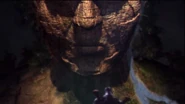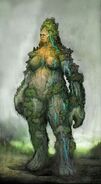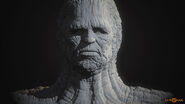
This article contains lore based on real-life sources of the Greek mythology as introduced from the God of War Greek era.
| “ | I am the Titan, Gaia; ever-present as the Mother of Earth. I have watched you become a powerful warrior, and I have been with you through all the events of your life, but I can no longer simply watch. | ” |
–Gaia. | ||
Gaia (Greek: Γαῖα) is the Primordial Goddess of the Earth, mother of the Titans and the grandmother/great-grandmother of the Olympian Gods. She is the narrator of the series, the deuteragonist of God of War II, and the secondary antagonist of God of War III.
Greek Mythology
In Greek mythology, Gaia (Γαîα) was the primordial goddess personifying the earth. She was an ancient chthonic deity and was considered the Mother Goddess of all life. Gaia is also known as Mother Earth. Gaia created Ouranos but later Ouranos (Roman: Caelus) and Gaia created the starry sky. Together they created the elemental Titans, amongst others the world ocean Oceanus, the pre-Olympic sun Hyperion ("The High-One"), Iapetus (father of Prometheus), Rhea, Mnemosyne ("Memory"), Phoebe ("Light") and Tethys (wife and sister of Oceanus, mother of the world rivers). After they were born, Cronos, the wily, youngest, and most terrible of her children, who hated his sire, was asked by Gaia to punish Ouranos for sending the Cyclops and Hecatonchires to Tartarus. Wielding a flint sickle, Cronos castrated him and threw his testicles into the sea, it's foam creating Aphrodite. After that, Cronos would rule the world until he was overthrown by Zeus and his siblings. Other Titan-born creatures came from Gaia such as the Hecatonchires and the dragon Python.
Her equivalent in the Roman pantheon was Terra.
In the God of War series
In the God of War series, Gaia is the narrator for all of the games from the Greek era but has only actually appeared in God of War II and God of War III. She is portrayed as being made of earth, covered head to toe with trees, and fuller in shape reminiscent of the Venus of Willendorf, though in Greek Mythology she was essentially the Earth itself.
Birth and Early Days
Being one of the Primordials, Gaia was a descendant of Chaos. Together she and the other Primordials created the Grecian universe. Wishing to survey their work, they made the Island of Creation, where all life would begin. The first to be born was Gaia, who would become the mother of the earth. Ouranos, the Primordial god of the sky and lord of the heavens, joined with Gaia and giving birth to Pontus, the Elder Cyclopes, the Hecatonchires, and the Titans.
In this ancient age at the beginning of time, Gaia and Ouranos ruled the primordial cosmos, ever expanding as their Titan children take over new and old domains. Ouranos was a cruel father and husband, of his offspring he permitted only the Titans to walk the Earth, while his elder sons, the monstrous and mighty trios of Cyclopes and Hecatonchires were discarded into the primordial abyss Tartarus, for this was the only place where the Skyfather wouldnt be able to look at them.
Gaia refused to accept this, and in her despair she took the council of Hyperion, the eldest and wisest of her Titan sons, who suggested that the only way to free his older siblings would be to shatter the dimensional barriers that separate the World of the Immortals from the dark and fiery Underworld, which would merge the two. The Earth Mother knew what had to be done and pulled herself and Hyperion into a domain beyond Ouranos ever-present ears, into the presense of the Primordial Fire, one of the first powers of nature that sprung from Chaos, the flame that will spawn all others.
She bestowed it on Hyperion, making him the Titan of the Sun with the power to merge the Abyss with the Earth and make the way for her childrens freedom. However, it wouldnt be her eldest son to free them all from the Tyrants grasp at his mothers behest, but the youngest, Cronos the Titan of Time and the Harvest, who alone had such great hate for his sire and hunger for power that would outmatch his fear of the all-powerful Skyfather.
In a terrible battle, resembling the Primordial clashes before the creation of the world the mighty Cronos slain and usurped his father and assumed the Lordship over the Cosmos himself, as the Golden Age of Titan rule began. Little did he know that it was doomed from the start as the new King, in a fateful decision refused to free his siblings from the Pit and honour his mothers only request.
First Titanomachy
It was prophesized that one day Cronos, the mighty ruler of the world would also be overthrown by his children, just as he overthrew his own father. In an attempt to avoid this, he swallowed them whole after they were born. However, Cronos's wife, Rhea, could not bear another loss and tricked Cronos into swallowing an Omphalos Stone wrapped in cloth. This baby was named Zeus and would be raised within Gaia's own body until he came of age and decided to take revenge upon Cronos.
When Zeus became an adult, he freed his brothers and sisters from the belly of Cronos and began a revolt against the Titans, starting the Great War, lasting for centuries. During this war, Gaia aided the Titans in the battle, fighting against both the young Gods aswell as Destiny itself, as the Sisters of Fate didnt favour Cronos against his rebelling sons. They decreed the fated defeat and banishment of the Titans, something that the Earth Mother would never forget.
Her sons and many of her grandsons were thrown into the Pit of Tartarus, while she herself was stripped of her physical form, leaving only her ever-present spirit within herself, the Earth.
Aftermath
Gaia, the Earth itself could not be contained like her Titan offspring. Though robbed of her titanic form, she was free to observe and sometimes influence the world. For some ages she was slumbering, for others she was scheming and planning. So it was, during the early phase of the Olympian reign, when Gaia concieved the powerful Storm-Titan Typhon together with Tartarus, the dark and fiery abyss personified. He would grow to become the Father of Monsters, living under the Earth together with his wife Echidna. He and his brothers, the earth-born Giants who were once brought forth by the Blood of Ouranos falling upon Gaia's surface, would eventually be called upon by their mother to depose the Gods of Olympus, which would ultimately fail and end with the Giants death by the mighty Zeus and Typhon being imprisoned within a great mountain.
Following these events and tragic failures on her part, Gaia kept a lower profile but all hope was not lost, as she was intrigued by the Marked Warrior prophecy, forseeing that one day a mortal warrior shall rise and destroy Olympus. Her grandson Zeus took steps to circumvent the prophecy, as he once did before when his first wife Metis was fated to bear a son that would overthrow him. But, defying Destiny and Prophecy was no light matter and this new prophecy could very well doom the reign of Zeus. After the King of the Gods sent his children Ares and Athena to retrieve his son Deimos from the city of Sparta, Gaia kept watch over his older brother, Kratos. Driven by the tragic loss, the demigods fierce and rageful nature only grew. Gaia took notice of him as early as his first years in the Agoge, exceeding his elders as a young boy. The Earth Mother patiently watched over the life of the Spartan Warrior and her great-grandson Kratos, watching on how the Gods turned him into their weapon. Now, all she needed to do was to wait for the ungrateful and arrogant Olympians to inevitably discard and betray the Spartan, hoping to use his talents in her desire for her future vengeance against Zeus.
God of War II
Alliance with Kratos
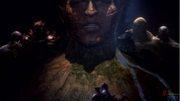
Following Zeus betraying Kratos and his subsequent fall into the Underworld, Gaia deemed the time was right to finally reveal herself to Kratos. As she awoke from her long slumber, she took notice of the world and its changes since her last awakening. The way the Olympians, like Ares, Athena and Zeus have toyed with Kratos and destroyed his life only reminded her how ungrateful and unworthy they are to rule.
She appeared before the Spartan who questioned her identity as she revealed her name and how she been watching him throughout all his life and has decided to help him destroy Zeus. She then heals his wounds and returns him to life, before telling him that with her help, she would guide to the Sisters of Fate to aid him in his quest for revenge against Zeus. Kratos saw her intervention as a great boon and act of power, which showcased Gaia's great power, but he also noticed a sense of desperation in her offer, the same that haunted him in the back of his mind, knowing his foe to be Zeus, the King of the Gods.
In her intervention and saving of Kratos, she defied his and her own decreed Fate. The Sisters, far away in their Loom Chamber are outraged at the percieved insolence of the Earth Mother and her Titans "meddling again" and not accepting their Destiny.
Gaia reached out to key Titans like the mighty Cronos and Atlas, aswell as her youngest son Typhon, to convince them of Kratos, the Ghost of Sparta and now fallen God, as a powerful warrior and a worthy ally of the Titans. While the first two agreed, along with many others like Iapetus, Hyperion, Themis and Rhea herself, Typhon refused out of fear for his wife Echidna and their many childrens life, and he also feels disillusioned with his mothers ever-present schemes against the Gods and feels that she was the one who doomed the Titans in the first place with her foolishness. He sees her new alliance with a fallen and disgraced God, as just another doomed effort and not worth risking the wrath of Zeus.
Once Kratos escaped from the grasp of Hades through the rift she opened, Gaia sent the Pegasus to help in his journey. When Kratos ordered the Pegasus to take him to Olympus, Gaia told him he was no longer a god and that he could no longer access the divine residence of the Gods. She then explains for Kratos to get revenge, he would need the power of the Sisters of Fate to travel back in time to the moment Zeus betrayed him so he could reclaim Blade of Olympus as Zeus would be at his most vulnerable. As he rides on the Pegasus, Kratos realizes the bravery of Gaia in aiding him and defying both Olympus and the Sisters of Fate. He decides he can show no less courage. She directed him to her son Typhon but the latter was not willing to aid an "Olympian" trapping the Pegasus as Gaia told Kratos it was needed to reach the Sisters. The Ghost of Sparta asks the Father of Monsters if he is willing to defy his mother, upon which Typhon proclaims his mother to be the reason for the Titans downfall and he himself to be the one who has suffered the most from her schemes, refusing an alliance categorically. As a result, Kratos was forced to explore the cavern before he managed to steal Typhon's Bane and soon coming upon Prometheus and after killing him to put him out of his misery. Gaia watched as her grandson, the son of Iapetus burned to death, his cries not of agony but relief, his blood and flesh merged with the fires of Olympus, which Gaia gathered and bestowed on Kratos in form of the Rage of the Titans which he used to free the Pegasus and leave the cavern.
On Olympus, Gaia spies on the affairs and plans of the Gods and notices how Hermes, the Messenger of the Gods reports to Zeus about Kratos ressurection and his theft of Typhon's Bane and release of Prometheus. Zeus increasingly erratic and paranoid behaviour amused Gaia as she welcomes the discord and petty feuds that are growing within the Olympian pantheon since after the death of Ares. After some thought, she realizes that it was the Sisters of Fate who have decreed for Hermes to report this to Zeus and be disgraced in his eyes and she wonders what exact machinations the Sisters have put in motion to stop the Titans return to power. The Sisters have chosen the winner in the Great War and they did so poorly, Gaia judges. Now her chance for retribution is nearer than ever, with the Marked Warrior, the Ghost of Sparta on his way to their Island that they guard so jealously.
Kratos soon arrived on the Island of Creation where he journeyed facing many enemies. In the middle of his quest, Kratos inquired as to why Gaia chose to aid him as she told Kratos the story of events that led to the Great War and how she was banished at the end of the but helped Kratos in his quest for revenge, as they both have the same enemy in Zeus. Even though she didnt comment on her youngest sons harsh refusal of her earlier, now she admitted to Kratos that in saving Zeus from his father Cronos, her act of compassion has doomed the Titans forever.
As Kratos journey went deeper into their Island, the Sisters grew more worried about Gaia's guidance of the Ghost of Sparta. Atropos claimed to her sister Lahkesis that Gaia laughs at their inability to stop him. When by herself, Lahkesis studied Gaia's green and earthen Thread of Fate, and in a moment of panic cut it, tried to sever it and end her life, but the Thread just absorbed it like wet mud and remained unruly, something that is extraordinary, as none can defy what the Fates decree, the Earth itself included.
It is later revealed that the thread of Kratos has intertwined itself with many of the Titans, including Gaia which may mean that she was sharing his independence and agency, through her alliance with him.
When Kratos nearly fell into the Underworld after a fight with Icarus, Gaia told Kratos that he needed to return to the surface. Perhaps fortunately and unfortunately, Kratos landed on Atlas who nearly crushed him but he managed to persuade him to aid him in destroying Zeus. Atlas helped Kratos in returning to the surface and the Spartan resumed his journey. When reaching the Garden of the Gods, Athena possessed a statue and warned Kratos not to trust Gaia or the Titans stating they are using him but he disregarded her warning by either destroying the statue or ignoring her (player's choice). When Kratos fought and killed the Last Spartan and was distraught by the destruction of his home Sparta, Gaia appeared in a mental image posing as Lysandra, Kratos' wife. As the Ghost of Sparta lost hope, Gaia warned him if Zeus discovered he was still alive the latter would come after him relentlessly and that when Kratos dies Zeus' brother Hades would ensure his soul would be forever tormented. She soon gave him hope again by telling him to take in his loss of his city and people to fuel his rage and achieve victory. She told him that he was needed to lead the Titans into battle. Her words encouraged Kratos and he defeated the Kraken and soon made his way to the Sister's palace.
Upon confronting Lahkesis, she stated Gaia was filling his head with lies before fighting him with her sister Atropos. This warning along with Athena's warnings foreshadowed Gaia's impending actions.
When Kratos trapped them both in a mirror, he destroyed it and erased them from existence. As he approached the Loom of Fate, Gaia cautioned Kratos of the power of Clotho, the genesis of creation. After the death of the final sister Clotho, the reign of the Sisters was over. The Earth Mother proclaimed that the World of Man and Gods was granted the ultimate freedom from the shackles of Destiny, and Gaia, in mentoring and guiding Kratos had her revenge upon them, for their cruel and unjust decisions against her and her children. Kratos gained access to the power of Time as Gaia told him to look among Threads of Fate for his own in order to go back to the moment of Zeus' betrayal. Kratos returned to the moment Zeus tried to kill him where he reclaimed the Blade of Olympus and confronted Zeus. After a fierce battle, he nearly succeeded in killing him but Athena intervened and Kratos stabbed her instead. A dying Athena revealed that Kratos was Zeus' son which by extension made Gaia his great-grandmother.
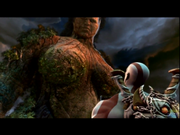
After Athena's last pleas failed to convince Kratos to abandon his revenge, Gaia reminded him that he still had the power to control time itself. With this Kratos returned to his time, he soon rewinds time to go further into the past going farther than his own birth to the final moments of the great war. Kratos called out to Gaia who had been expecting his arrival stating the gods were too much for them now. However, Kratos told her that Ares and Athena were dead while Zeus was weakened and that he now possessed the Blade of Olympus. He told her that if they work together, they could destroy the gods and see Mount Olympus crumble.
Realizing that he needed them to come to his future, Kratos told Gaia to come to his time along with the other Titans from the first Great War. This act saved them from their banishment to Tartarus and allowed them to scale the mountain to exact vengeance. Gaia carried Kratos on her back as the Spartan told Zeus that his son had returned to bring forth the destruction of Olympus. This marked the beginning of the Titans' Second Great War with the gods.
Second Titanomachy
Gaia and Kratos led the Titans in battle as they climbed Mount Olympus, however, the Olympian Gods were not scared and quickly engaged their former enemies again igniting the Second Titanomachy. As Titans clashed against the Gods they also encountered the minions of Gods who jumped into the fray and used their abilities to attempt to knock the behemoths off the mountain but this did not deter the Titans nor Kratos who defended them with his powers determined to make the Gods pay. Unfortunately, the Sea God Poseidon entered the battle and after killing Epimetheus summoned his Hippocampi which began to attack the Titans pulling them to their deaths. One of the monsters latched onto Gaia preventing her from climbing, the titan had told Kratos to free her from the constraints after doing so the two came face to face with the Hippocampi version of Poseidon who using his mighty trident and his minions had delivered many powerful blows to Gaia. However, after Kratos defeated the monsters and attacked Poseidon's head, the god was left immobilized. Taking advantage of this, Gaia punched at her grandson's chest which also launched Kratos in a clear path of the sea god's chest knocking him out of his monster projectile and throwing him on a platform of the mountain where he was brutally killed off personally by Kratos.
After Poseidon's death, Gaia told Kratos the death of Zeus was within their reach and the two continued their travel towards Zeus. Arriving at the Dias, the two confronted Zeus who traded words with his son over his quest for vengeance as Kratos swore to destroy him but the King of the Gods prepared to fire a lightning bolt at them. Gaia attempted to halt the attack but it was futile as the blast sent Gaia and Kratos plummeting back down the Mountain.
Betraying Kratos
| “ | Listen carefully Kratos, you were a simple pawn nothing more! Zeus is no longer your concern. This is our war! Not yours! | ” |
–Gaia betraying Kratos and allowing him to fall to his "death". | ||
Gripping to Mount Olympus for dear life, one of Gaia's hands partially snapped off due to Zeus' attack barely connected by enormous vines. Kratos attempted to hold onto Gaia's back with the Blade of Olympus, but after calling for aid, Gaia refuses, stating both of them would die if she tried to help, and trivializing Kratos' revenge as being secondary to the Titans' own goal for vengeance. Gaia then told him that he was a mere pawn that had lost its usefulness, before letting him fall stating the war was for the Titans. As the Spartan fell, he swore revenge on Gaia for using him.
Gaia's downfall
| “ | You were a means to an end, Gaia. Nothing more!
But I must face Zeus. The Titans must take down Olympus! No! This is my war. Not yours. |
” |
–-Kratos to Gaia after her betrayal. | ||
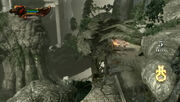
When Kratos escaped the Underworld after killing Hades, he managed to reach the city of Olympia, where he encountered Gaia again. The titan was astonished to find Kratos still alive remarking the "blood of Cronos" served him well. She was in distress, asking Kratos for his help as Kratos, still enraged about Gaia not having helped him in his hour of need, questioned why he should. Gaia soon begged her great-grandson for help but Kratos started to sever the vines connected to Gaia's snapped-off hand. Desperate and in pain, Gaia asked Kratos if she meant nothing to him, to which the Ghost of Sparta retorted in a show of cruel irony it was, in fact, Gaia who was the pawn, his pawn while telling a pleading Gaia that the war against Zeus was "his war" not hers. Kratos then destroyed the root of Gaia's hand with the Blade of Olympus, sending a screaming Gaia plummeting to her apparent doom at the bottom of Mount Olympus. This resulted in most of the Titans growing in hatred and resentment towards Kratos for killing their beloved "Mother of the Titans".
Much later, Perses attacked Kratos in shafts of the labyrinth presumably for what happened with Gaia but Kratos killed him instead.
When Kratos visited Tartarus, he came across Gaia's severed hand and met with Cronos, who stated Gaia was dead and subsequently attempted to kill Kratos to avenge her only for Kratos to kill him. Despite their differences, Cronos held his mother in high regard and mourned her suppossed death.
Gaia's Death
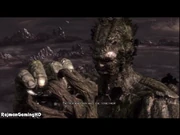
When finally having reached Zeus again, Kratos did battle with him before their fight was interrupted as Gaia had returned, having replaced her severed hand with one made of twisted tree roots. Declaring the reign of Olympus ended now, Kratos was shocked that she survived as states she never sought Kratos' death, but she now saw no other option due to the damage he had inflicted upon her Earth. Zeus commented she should have chosen the other one, but Gaia simply replied she would destroy them both, crushing the Shrine of Olympus in her hands.
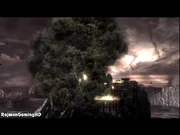
Both father and son fell into Gaia and found their way back to her heart, where Kratos shattered its defenses, and drew energy from the Titan, causing her immense pain. After Zeus made his appearance, the battle resumed, until Kratos stabbed Zeus with the Blade of Olympus and ran him through Gaia's heart, she screamed in terrible agony and pain as her heart exploded, killing her as her body collapsed onto a section of Olympus while dissolving into dust.
When Kratos awakened from the fall, all that remained of the mighty Titan were large chunks of earth, and some withered trees and branches.
Gallery
Concept Art
Personality
Gaia was once a caring and loving Titan, helping anyone no matter the cost. She even cared for and nurtured Zeus, when the young god was hiding from his father Cronos. However, after the Great War, when all Titans were punished for the crimes of one, Gaia's heart became filled with hatred for Zeus and the Olympians. She became so obsessed with vengeance that she started to rebel against the Sisters of Fate themselves, manipulating Kratos as a pawn and then, discarding him and anyone else who dared to cross her path, only seeking to exact her revenge against the Gods of Olympus.
Powers and Abilities
Powers
- Omniscience: Gaia can be considered to have omniscience since she is narrator of the games.
- Omnipresense: Throughout Time and Earth, aswell as chtonic realms like Tartarus, Hades, Elysium and the Domain of Death or the Seas and the Skies, she was able to follow Kratos journey anywhere he went.
- Geokinesis: As the primordial and personification of the earth, Gaia has absolute control and manipulation over rocks and plants of the world. Her mere breath causes mountain ranges to rise and continents to move. She was able to open the Earth and let Kratos escape the Underworld. Her embodiment of the Earth goes so far that she can effortlessly spy on Zeus throne chambers on Mt. Olympus, for wherever there is dirt and rock, there is Gaia.
- Acausality: Was unaffected by Kratos altering the timeline in God of War II, is immune to any temporal paradoxes as are all the Greek dieties. Knew of Kratos and the future events several thousand years before they came to be. The Titans also consider Time itself to be meaningless.
- Prophecy: As the first oracular diety, Gaia has the power of pre-cognition and divination. She predicted that the Titans shall one day rise and be freed by a champion.
- Fate-Defiance: Though bound to her Thread of Fate just as the rest of the Titans and Gods for ages, Gaia was able to defy her and Kratos' decreed fate with her intervention during his descent into Hades, with the Sisters being outraged when it happened. Her defiance continued throughout her mentoring of Kratos from Rhodes to the very Temple of the Fates. She laughed at the Fates, as they failed to end her meddling. At one point Lahkesis, being briefly panicked cut her Thread, which just absorbed it like wet mud. It is likely that her alliance with Kratos, which caused their Threads to intertwine made her share his total defiance of Fate and Destiny, though her initial intervention was entirely her own choice.
- Conceptual Embodiment: She represents the Earth and Nature, as she suffers from Kratos cataclismic rampagne. Gaia is stated to be "the quintessential Earth Goddess, Earth Mother", as she stands for the Earth she also does for Motherhood, the struggle between old Earth-based matriarchal beliefs and the newer patriarchal systems based on the Heavens and Skyfathers.
- Incorporeality: Her Titan state is merely a physical avatar of her true self, which exists as the embodiment of the Earth and as a formless spirit. This seems to have shielded her from being confined to Tartarus like her offspring, as she is the Earth and cannot be seperated from herself.
- Superhuman Strength: As a Titan, Gaia has superhuman strength. She was able to damage Poseidon's elemental form with a single punch.
- Superhuman Durability: As a Titan, Gaia had superhuman durability. She could survive multiple attacks from Poseidon and his Hippocampi. However, she was taken out by a single Thunderbolt from Zeus, with her hand breaking off.
- Power Bestowal: Gaia is able to bestow great power to those in her favour. As she did with Hyperion, when she granted him the Primordial Fire and so she did again eons later with Kratos, whom she granted the Rage of the Titans, along with a later empowerment through the Fires of Sparta.
- Telepathy: Gaia seems to have the power to communicate throughout time as she was expecting Kratos during the first Titanomachy even though it was centuries before his birth. She was able to interfere in Kratos visions and stop them outright and talk with people in their minds, like with Kratos or imprisoned Titans like Atlas and Thera.
- Healing Factor: Gaia possesses considerable regenerative abilities, as she was able to grow back the hand Kratos chopped off of her. She also was able to heal and close Kratos wound from the Blade of Olympus, aswell as bring him back to full fitness. An act of power that Kratos appreciated and saw as proof of Gaia's worth of as an ally against Olympus.
- Immortality: As a Primordial, Gaia is immortal.
Trivia
- According to the God of War II novel, which was stated to be canonical and in continuity unless otherwise shown, Gaia's physical form is unbound by her true, ethereal form, which exists as an incorporate spirit - the Earth itself, hence why she was able to communicate with Kratos and watch every moment of his life even after the Titan War. This suggests that Gaia might still be "alive", in the loosest sense of the word, in her true form.
- In the first God of War novel, Athena claims that Gaia is responsible for the Cycle of Patricide, having placed an "immortal curse" throughout all time, for all who spill the blood of their kin.
- Gaia, serving as Narrator in all of the God of War games prior to God of War III, is voiced by actress Linda Hunt. In God of War III, no longer the narrator, she is voiced by Susan Blakeslee. However, in the opening cinematic detailing Kratos' past, Linda Hunt still narrated the prologue. Susan Blakeslee voiced the Oracle of Athens who helped Kratos on how to kill a god.
- Interestingly, Gaia only narrates the story of God of War II up until the point when Kratos first meets her in the Underworld. Beyond that, she does not narrate but has a similar job by speaking directly to Kratos in the background on numerous occasions throughout the game.
- The last words Gaia said as the narrator, right before rescuing Kratos, were: "Kratos was destined to bring about change so severe that it would shake the very pillars of Mount Olympus. His death was something that I could not allow."
- In God of War II, it is strange to note that Gaia had expected Kratos' sudden arrival in the Titanomachy's end, even though the battle had taken place thousands of years before, in which the Titans were defeated and imprisoned. It could be that, due to the fact that Gaia is, essentially, the earth itself, she would be able to foretell events that transpire(d) in the past, present, and future.
- When Gaia is rescued at the end of God of War II and brought back to Kratos' time, it is a wonder what happened to the Gaia who is being held in Tartarus, who has been instructing Kratos the whole time. The Gaia whom Kratos rescues also says that she and the Titans are expecting Kratos, even though she is from the ages past, and is not the one who guided him to the Sisters of Fate (all of which happened in the future). Because of Kratos' interference in the timeline, it is likely that the Gaia in Tartarus has been "erased" and "replaced" with the one Kratos brings back to his time.
- Though Gaia is addressed as being one of the Titans in the God of War series, she wasn't considered one in real myth. In real Greek mythology, Gaia was essentially the earth itself. With Ouranus embodying the sky, she then gave birth to the twelve Titans. She, in fact, was a member of the first generation of deities in the Greek pantheon known as the Protogenoi (Primordials). Other members were Ouranus, Pontus, her sister Nyx and brothers Erebus, and Tartarus to name a few.
- Gaia first sided alongside Kratos in his quest for revenge, only to reveal he was being used as a pawn when finally reaching Zeus. This turn of events did not bode well and proved her downfall.
- Gaia's deceptive nature and future betrayal are alluded to in God of War II in two instances.
- When Kratos visits Garden Of Gods, he comes across a statue of Athena telling him to stop his quest and not listen to Gaia by saying, "Gaia speaks nothing but half-truths and falsehoods".
- When Kratos finds Lahkesis, she tells Kratos that his journey ends now while he says his destiny is not hers to control Gaia is a liar in words "I see Gaia has filled you with her lies".
- Gaia makes a cameo in the fighting game Mortal Kombat 2011, on the Chamber of the Flame stage. She is revealed when she destroys a section of the wall, and her face can be seen in the distance viewing the fight on the platform.
- Gaia and Athena have similar voices to each other in the first game but they are not voiced by the same actress.
- Gaia, like the Furies, was directly born from the Primordial War and could thus be considered a "primordial entity", regardless of her status as a Titan in the God of War mythos.
- When the Hippocampi appears for the first time, it seems to rip a hole through one of Gaia's hands. However, when Zeus strikes Gaia with a lightning bolt and she falls from the top of the Mount Olympus, the wound caused by the Hippocampi is not seen. This possibly makes an error or a part of her regenerative power.
- Out of all the Titans present in the game, Gaia plays the largest role in Kratos's story, serving as the narrator prior to the second game, the deuteragonist in the second as well as an antagonist in the third. It could even be argued that she played a much greater role than the other Titans combined including Kronos and Atlas.
- One of her granddaughters Demeter, seems to have carried on in her role and inherited her power over vegetation and agriculture, being called the Earth Goddess in Chains of Olympus.
- The Jötuun Fjörgyn, the mother of Thor, may have been Gaia's and Demeter's Norse counterpart atleast in name, but it is unlikely that she shared the same power and embodiment of the Earth, as the Greek dieties and the Jötnar differ greatly in divinity and power.
| |||||||||||||||||||||||||||||
| |||||||||||||||||||||||||||||
| |||||||||||||||||||||||||||||
| |||||||||||||||||||||||||||||



